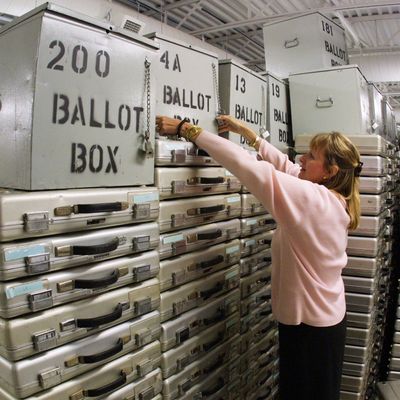
Most anyone old enough and tuned-in enough to remember the extended nightmare of the 2000 presidential contest would not want to repeat the experience. I can recall waking up on more than one morning during those November and early December days wondering if I had dreamed up the Florida recount with its bizarre twists and turns — only to turn on the tube and discover the lurid reality all over again. That it would end with a blatantly partisan Supreme Court majority awarding the presidency to George W. Bush seemed a fittingly awful conclusion.
It is always possible that the 2016 election will be insanely close, with the electoral-vote majority hanging in the balance as ballots are recounted by some overwhelmed county canvassing board in a previously obscure locale. But we are already well along the more likely route to a disputed election, based on a combination of paranoia and the very real vulnerabilities of our rickety, state-and-local-backwater-dominated election system.
On the question of systemic vulnerabilities, the possibility of an operation originating in Russia (whether it is government-directed or not) to hack the election results is serious enough to command the attention of top U.S. intelligence officials:
A Russian influence operation in the United States “is something we’re looking very closely at,” said one senior intelligence official who, like others interviewed, spoke on the condition of anonymity to discuss a sensitive matter. Officials also are examining potential disruptions to the election process, and the FBI has alerted state and local officials to potential cyberthreats.
The official cautioned that the intelligence community is not saying it has “definitive proof” of such tampering, or any Russian plans to do so. “But even the hint of something impacting the security of our election system would be of significant concern,” the official said. “It’s the key to our democracy, that people have confidence in the election system.”
And that is the deeper problem: The alleged Russian operation appears aimed at sowing “public distrust in the upcoming presidential election and in U.S. political institutions.” So whether or not there is any tampering with vote-casting or vote-counting, the perception that it has happened is victory enough for the perpetrators. And proving that an election has not been hacked is not very easy.
For one thing, four competitive states are still using electronic touch-screen voting machines that do not provide a paper printout for verification of counts. It’s far too late to do anything about it before November 8.
That’s plenty of time, however, for the other factor taking us down the road to a 2000-style disputed-election nightmare to build and build: the paranoid conviction among Donald Trump supporters — being fanned very deliberately by the candidate himself and his surrogates — that the election will be stolen by Hillary Clinton, if it has not already been “rigged.”
After summarizing the many occasions on which Trump and some of his most prominent supporters have warned he might be robbed of the presidency, the New York Times’ Thomas Edsall quotes political scientist Seth Masket as drawing the ominous implications:
Part of the reason that our nation has been relatively free of political violence is that losers of contests have nearly always accepted their loss and opposed the victor through legitimate means, such as challenging them in future elections or working against their agenda in Congress. The 2000 election was very close and obviously very controversial, but Al Gore nonetheless conceded after the Supreme Court’s ruling. Were Trump and his supporters to continue to argue that the election had been stolen from them, it would mean that they reject nonviolent solutions to political differences. It could jeopardize future elections, undermine the legitimacy of the federal government, and create an environment in which political violence becomes more likely.
Just what the mischief-making doctor in the Kremlin may have possibly ordered, eh?
The relevance of either legitimate fears about a hacked election or of highly partisan (if disingenuous) claims of “voter fraud” or ballot-box stuffing obviously would be maximized by a very close election. As it happens, a very close election is what the polls are pointing toward now.
It would be helpful to fully explode before election day some of the hoary right-wing myths of “voter fraud” that will otherwise pop up immediately if Clinton narrowly defeats Trump. But that may matter only at the margins. People inclined to believe that Barack Obama is a Muslim born in another country or that the IRS is systematically persecuting Christian conservatives will certainly believe the bad guys could place a thumb on the scales when votes are counted — even if the bad guys most likely to tamper with the election are probably wearing buttons with “Hillary for Prison” written in Cyrillic script.
So fasten your seat belts, folks, and if you have any spare time, you might want to read or re-read Jeffrey Toobin’s Too Close to Call: The Thirty-Six-Day Battle to Decide the 2000 Election. Don’t know about you, but I cannot count the number of times I’ve heard people — not just journalists, but regular folks — say they have never been so eager for an election cycle to end. We could again find ourselves waking up each day to a living nightmare.






























